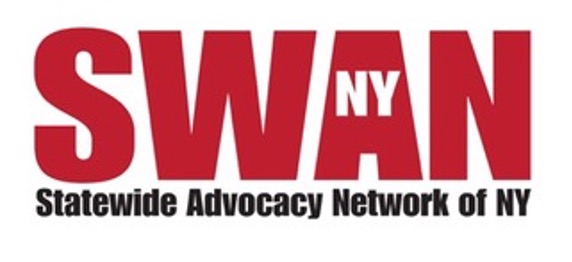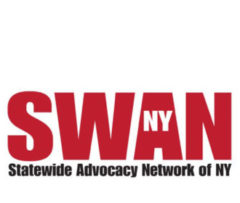
- SUPPORT IMMEDIATE FUNDING FOR PEOPLE WITH DISABILITIES
The Governor’s proposed budget is a great step toward reversing a decade of chronic underfunding. New Yorkers with Intellectual and Developmental Disabilities (IDD), and their families across the state appreciate Governor Hochul’s commitment to increase immediate funding of essential IDD services in the 2022-23 budget cycle. New York’s IDD service system is collapsing due to years of chronic underfunding, budget cuts, diverted resources and low wages. The proposed, immediate increase in funding is critically needed; however, New York must also prioritize long-term funding for people with IDD and the nonprofit workforce that supports them. Services for people with IDD must be funded to remain in compliance with the Americans with Disabilities Act.
- ADDRESS THE EMERGENCY DISABILITY WORKFORCE SHORTAGE
Direct Support Professionals (DSPs) are now leaving the field in record numbers, as are other front line workers in the field. There are dangerously high staff vacancy rates and work force gaps within service delivery systems, creating instability, insecurity and high risk for our loved ones. Programs are closing as families across the state live in fear and isolation, without critically needed services and with little hope for the future. New York has a unique opportunity to reverse this dangerous and destructive trend by investing heavily in the IDD nonprofit workforce now and ensuring continued, ongoing investment in the future. This reoccurring investment is desperately needed to retain and rebuild a strong workforce.
- INSTITUTE A MULTI-YEAR INVESTMENT IN THE DIRECT CARE WORKFORCE
Policy makers must commit to a long term nonprofit workforce investment plan to stabilize the field of service provision for people with IDD. This workforce investment is the only way to ensure the future, safety and well-being of some of the most vulnerable citizens of our State, citizens who include the newly diagnosed as well as aging individuals and their aging caregivers, requiring an investment in resources for a growing, unmet need. There are tens of thousands of New Yorkers with IDD whose needs require residential services, some having waited more than a decade, yet their needs are still unmet. It is imperative that we ensure fair access to a diverse continuum of inclusive services for people with IDD to meet a wide range of need. This cannot be accomplished without New York’s honorable nonprofit workforce and compensation commensurate with the enormous responsibility they bear.
- INVEST IN NEW YORK’S ECONOMIC RECOVERY AND SYSTEM OF CARE
New York is not alone. Systems of care for the disabled across the nation face similar challenges. New York’s disabilities workforce is an essential statewide economic driver that contributes more than $2.2 billion in State and Federal taxes. Long-term investment in the disabilities workforce will only increase this contribution while supporting our communities and the health and well-being of hundreds of thousands of our citizens and families. New York’s disabilities field generates an economic impact of $14.3 billion in communities across the state. By investing now and in the future, New York once again has the opportunity to demonstrate great national leadership in providing supports and services to people with intellectual and developmental disabilities.
February 2022
- WHAT WE ARE ASKING FOR:
- Implement Governor Hochul’s Proposals for People with Intellectual and Developmental Disabilities (IDD) in the Final 2022-23 Budget:
- Enact the 5.4% Cost of Living increase for nonprofit IDD service providers
- Support the $3,000 DSP retention bonuses
- Make the $3,000 DSP retention bonuses permanent and amend the hourly rate criteria to capture DSPs working part-time (15 hours or more) to full-time (30 hours or more)
- Add a $5,000 personal income tax credit for DSP households earning under $100,000 (S.7643/A.9200)
- Support statewide direct care staff workforce initiatives to professionalize and create a pipeline, including DSP professional job code, recruitment, credentialing and career ladder programs
- Amend Nurses Across NYS proposal to specify OPWDD and OMH as eligible workplaces
- Provide 11% tuition rate increase for nonprofit, specialized preschools and private schools serving students with IDD, and allow them to keep it by discontinuing rate reconciliation
- Support $4.5 million investment to support intensive behavioral services and expand crisis intervention services
- Support the $50 million Nonprofit Infrastructure Capital Investment Program
- Amend Statewide Healthcare Transformation Program IV to include IDD community based partners
- Enact a requirement for OPWDD to clearly provide families with information about their placement on the State’s registry for residential placement
- Long-Term Solutions:
- Incrementally raise reoccurring DSP base wages over time to improve long-term recruitment and retention.
- Support statutory reform to alleviate systemic regulatory burden
- Provide a detailed plan to expand and preserve a diverse, person centered continuum of sustainable IDD supports and services to address unmet need, including a continuum of residential and employment supports and services.
The State-Wide Family Advocacy Network of New York State is an independent coalition of like-minded organizations from around New York State; comprised of the families, guardians, and friends of people with Intellectual and Developmental Disabilities. Our mission is to educate and inform policy makers, the media and the public on issues impacting our disabled children and loved ones. SWAN is an independent, all-volunteer organization that receives no government or service provider money; its activities are entirely self-supported. We are committed to a constructive, cooperative effort with all parties wishing to improve the lives of our loved ones, the citizens with disabilities of New York State.
2-22-22-SWAN-Budget-Advocacy-Messaging-FINAL-1